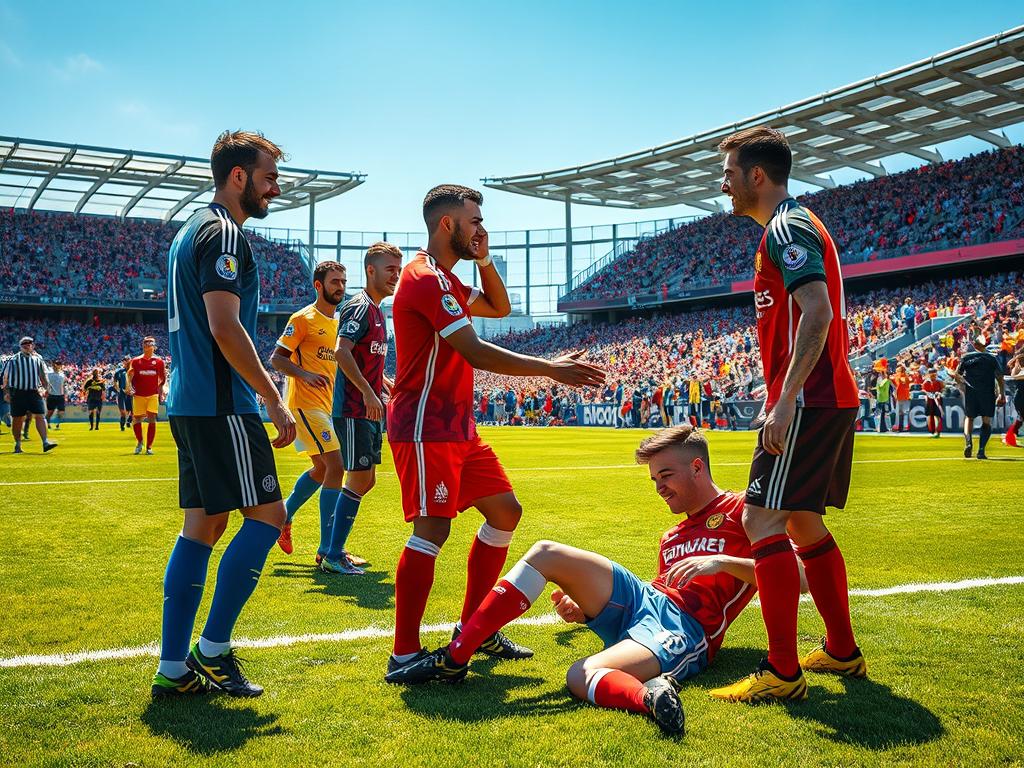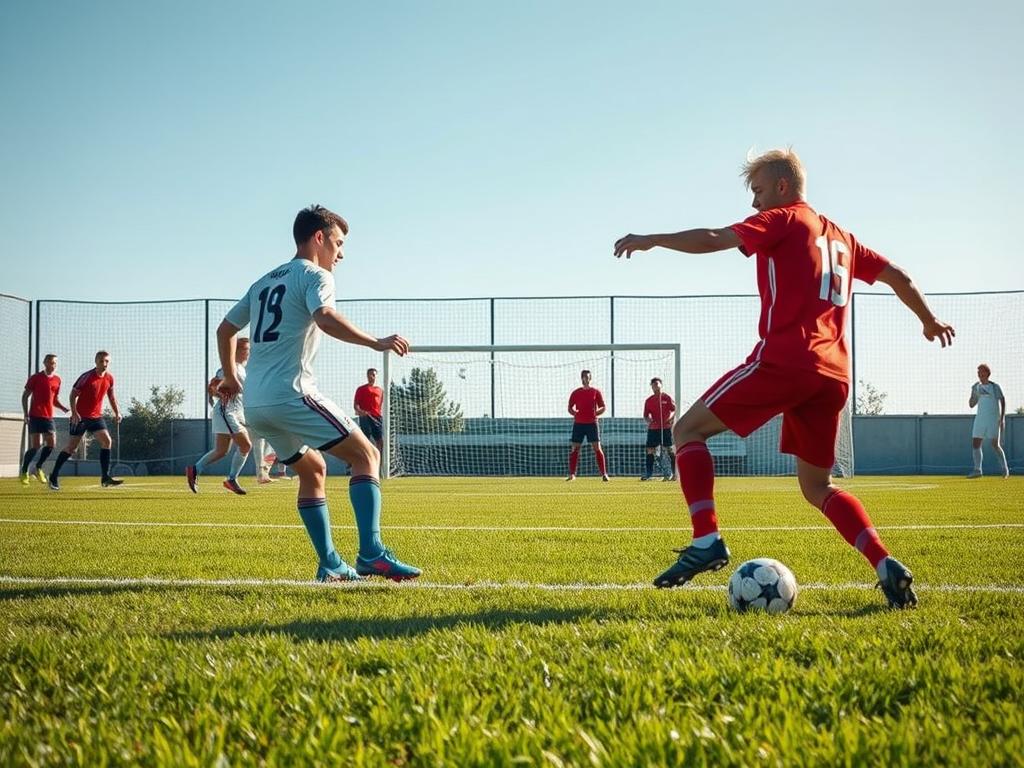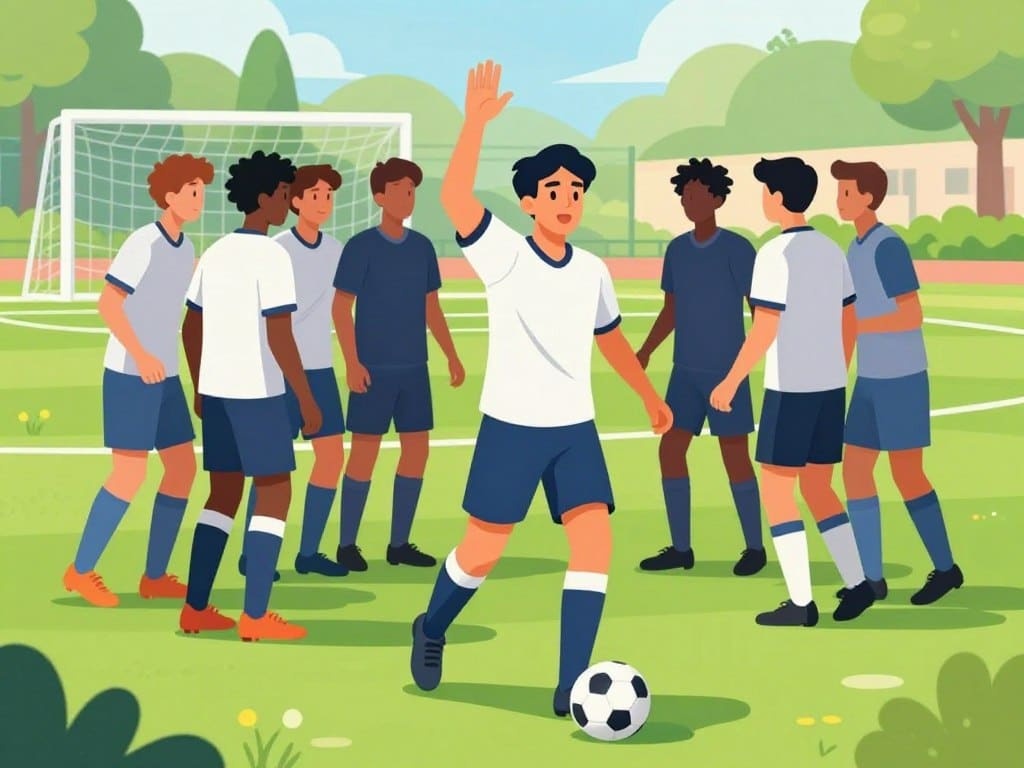Want to know how to practice good sportsmanship in soccer? It’s more than just shaking hands after a match. Soccer etiquette shapes the game’s spirit, fostering respect in sports and building team spirit. Let’s explore how fair play and positive behavior can elevate your soccer experience, both on and off the field.
Soccer isn’t just about scoring goals; it’s about how you play the game. The MHSAA Sportsmanship Summit, first held in 1997, highlights the enduring importance of fair play. Campaigns like “Good Sports are Winners” and “Battle of the Fans” have championed sportsmanship for decades, showing its role in youth development.
Coaches play a big role in fostering good sportsmanship. They focus on respect and positive behavior over wins and losses. This creates a supportive environment where players celebrate each other’s efforts, win or lose.
Parents and caregivers are also important. By focusing on an athlete’s growth, not just game outcomes, they encourage sportsmanlike conduct. Open communication, setting process goals, and cool-down periods after games help build a culture of respect in soccer.
Understanding the Fundamentals of Soccer Sportsmanship
Soccer is more than just scoring goals. It’s about fair play, respect, and ethical behavior. Let’s explore the core values that make soccer a game of honor and integrity.
Defining Good Sportsmanship in Soccer
Good sportsmanship in soccer means playing by the rules and treating everyone with respect. It’s about shaking hands after a match, helping up a fallen opponent, and avoiding trash talk. Studies show that 80% of players offer a hand to help opponents up, showing widespread respect on the field.
The Importance of Rules and Fair Play
Soccer rules are the backbone of fair play. They ensure everyone plays on an even field. Players who follow the rules set a positive example. In fact, 90% of players avoid confrontations with referees, showing high respect for officials. Learning and discussing soccer rules helps everyone enjoy the game more.
Core Values of Soccer Etiquette
Soccer etiquette goes beyond the rulebook. It’s about how players conduct themselves on and off the field. Key values include:
- Respect for officials and their decisions
- Treating opponents with dignity
- Supporting teammates through wins and losses
- Showing modesty in victory and grace in defeat
These values shape player conduct and foster ethical behavior. They create a positive environment where everyone can enjoy the beautiful game. Remember, good sportsmanship isn’t just about following rules – it’s about embodying the spirit of fair play in every kick, pass, and goal.
How to Have Sportsmanship in Soccer
Good sportsmanship in soccer is more than just playing the game. It’s about how you act on and off the field. Let’s look at important sportsmanship aspects every soccer player should follow.
Showing Respect to Officials and Their Decisions
Respecting referees is key in soccer. Agree with their calls, even if you don’t agree. Remember, referees can make mistakes. Your attitude towards them shows your team’s and opponents’ values.

Treating Opponents with Dignity
Respecting opponents is a big part of soccer sportsmanship. See your rivals as friends or guests. Wish them luck before the game and congratulate them after, win or lose. Stay focused on playing well, not bringing others down.
Supporting Teammates Through Wins and Losses
Supporting your team is important in both wins and losses. Help your teammates when they make mistakes. Celebrate wins together without showing off. Be there for each other in tough losses. This strengthens team spirit and improves performance.
- Communicate positively with teammates
- Offer encouragement during challenging moments
- Celebrate wins humbly as a team
- Support each other after losses
Sportsmanship in soccer is more than following rules. It’s about having a positive attitude that makes the game fun for everyone. By respecting officials, valuing opponents, and supporting your team, you help keep soccer fair and enjoyable.
Displaying Positive Behavior on the Soccer Field
Soccer is more than just scoring goals. It’s about showing a positive attitude and fair play. Players need to practice self-control and use respectful communication. This makes the game fun and safe for all.
Good sportsmanship starts with how you act. Don’t be a showoff or hog the ball. Instead, cheer for good plays by both teams. Treat others how you want to be treated. This builds respect among players, coaches, and fans.
It’s not just about winning. The American Youth Soccer Organization (AYSO) focuses on positive coaching. They suggest players try all positions during the season. This helps everyone learn and grow.
- Be first to arrive and last to leave practice
- Play at least three quarters of the game
- Don’t yell at the referee or other players
- Praise teammates for good plays
Most soccer players value good behavior. 78% believe following rules is key to fair play. 92% think it’s important to recognize hard work and skill in others. By showing respect, you make the game better for everyone.
Building Team Spirit Through Good Sportsmanship
Team spirit is the heart of soccer. It turns a group of players into a unified force. Good sportsmanship is key in building this spirit. It makes a supportive atmosphere where everyone feels valued and motivated.
Encouraging Teammates During Challenging Moments
When the game gets tough, team morale is most important. A word of support after a missed shot or a pat on the back after a tough tackle can help. These small acts of kindness can lift spirits and keep the team focused.
Celebrating Team Success Appropriately
Wins are sweet, but how we celebrate them matters. Celebrate collective success, not just individual glory. A simple high-five or a team huddle can be more powerful than a solo victory dance. This builds unity and shows everyone contributes to the team’s success.
Creating a Supportive Team Environment
A supportive atmosphere is key for team growth. Encourage positive reinforcement among teammates. Recognize each player’s unique strengths and contributions. This creates a culture where players lift each other up, boosting overall performance and enjoyment of the game.

Remember, good sportsmanship isn’t just about how you play – it’s about how you treat others. Fostering good sportsmanship in youth soccer can have lasting impacts on players’ character development. By focusing on team spirit, we create an environment where everyone can thrive both on and off the field.
Managing Victory and Defeat Gracefully
Soccer teaches us more than just how to play. It shows us how to win and lose with grace. This teaches us about sportsmanship.
Accepting Losses with Dignity
It’s hard to lose gracefully, but it’s very important. When we lose, we should praise the other team’s effort. We should shake hands, say congratulations, and think about how we can get better next time.
Celebrating Wins with Humility
It’s also key to win with humility. When we win, we shouldn’t get too carried away. We should thank our teammates, coaches, and the referees. We should also respect the effort of the opposing team.
Learning from Both Outcomes
Every game teaches us something, win or lose. We should look at our performance, see what we did well, and work on what we can improve. This way, we keep getting better in soccer and in life.
At Cochrane Wolves FC, we focus on sportsmanship. Our players learn to celebrate wins with joy but also with humility. They also learn to face losses with courage. This helps them grow into well-rounded athletes, both on and off the field.
Role Modeling Sportsmanship for Youth Players
In youth soccer, mentorship is vital for shaping the next generation. Coaches, parents, and older athletes can positively influence young players. They do this by showing respect for officials, opponents, and the game. This creates a supportive environment for young soccer fans.
Teaching responsibility is key in youth soccer. Encouraging players to take ownership of their actions builds accountability and resilience. Supporting a teammate who makes a mistake can greatly impact team morale. It also teaches valuable life lessons.
It’s important to celebrate wins with humility and accept losses with grace. Coaches should teach players to respect all players’ efforts, not just their own team’s. This fosters a spirit of true sportsmanship. It helps young athletes understand the importance of fair play and respect in soccer and life.







